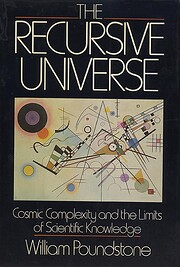

Carregue numa fotografia para ir para os Livros Google.
|
A carregar... The Recursive Universe: Cosmic Complexity and the Limits of Scientific Knowledge (edição 1984)por William Poundstone
Informação Sobre a ObraThe Recursive Universe: Cosmic Complexity and the Limits of Scientific Knowledge por William Poundstone
 Nenhum(a) Ainda não há conversas na Discussão sobre este livro. sem críticas | adicionar uma crítica
Pertence à Série da Editora
This fascinating popular science journey explores key concepts in information theory in terms of Conway's "Game of Life" program. The author explains the application of natural law to a random system and demonstrates the necessity of limits. Other topics include the limits of knowledge, paradox of complexity, Maxwell's demon, Big Bang theory, and much more. 1985 edition. Não foram encontradas descrições de bibliotecas. |
Current DiscussionsNenhum(a)Capas populares
 Google Books — A carregar... Google Books — A carregar...GénerosSistema Decimal de Melvil (DDC)003Information Computing and Information Systems TheoryClassificação da Biblioteca do Congresso dos EUA (LCC)AvaliaçãoMédia: (4.11) (4.11)
É você?Torne-se num Autor LibraryThing. |
||||||||||||||||||||||||||||||||||||||||||||||||||||||||||||||||||||||||||||||||||||||||||||||||||||||||||||||||||||||||||||||||||||||
It's basically about the "game" Life, invented by the mathematician John Horton Conway. It's not really a game in any ordinary sense. It is a cellular automaton. Consider a two dimensional plane on which a square lattice is situated. Each site in the lattice houses a bit of state, a variable that takes on the values 0 or 1 at successive time steps. Each cell in the lattice follows the same rule. It looks at the states of its 8 neighbors in the lattice, along with its own state. It applies the rule then to determine its own state in the next time step. Every cell in the lattice applies the same rule, all cells together in lock step. Conway found a particular rule, deceptively simple, that gives rise to especially nice patterns of 0 and 1 appearing and evolving as time proceeds.
The basic shock of the books is to see how this one very simple rule can give rise to stunning complexity. Poundstone does a splendid job of building up patterns from simple to complex. The primitive rule is eminently understandable, but the patterns it can give rise to exceed any possible comprehension. It is not unreasonable to think that our universe is similarly constructed from similarly simple patterns. The conclusion is thus that it is not reasonable to expect the patterns that arise to be comprehensible.
Check out: https://www.youtube.com/watch?v=C2vgICfQawE (